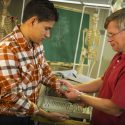Professors propose ways to make ‘Wisconsin Covenant’ a success
May 10 is the first day that the state's eighth graders can sign up for the Wisconsin Covenant, a recent policy proposal from Gov. Jim Doyle that guarantees students who commit to the program a place in the Wisconsin higher education system and a financial aid package.
However, the Covenant faces questions from legislators and the public about how the policy will work. To help guide the development and direction of the Covenant, two professors from the UW–Madison School of Education have drafted a policy brief offering independent research-based principles and strategies.
The authors, Sara Goldrick-Rab and Douglas Harris, assistant professors of educational policy studies, show that the current higher education system in Wisconsin "conflicts with the notion that educational access should be based on merit rather than family wealth." To address this problem, and the state's need for a highly educated workforce, they argue that the Covenant should focus on narrowing the gap in college access and success based on family income.
"If designed properly, the Covenant has the potential to raise student expectations and improve academic preparation for college," the authors state in the brief.
Goldrick-Rab and Harris offer three guiding principles as a way to ensure the Covenant's success:
- Target scholarships based on both merit and financial need;
- Offer grant aid, not loans, that covers tuition, fees, and some living expenses for the lowest-income students; and
- Provide students with academic and application support to help them meet the Covenant's challenges.
This is the first in an ongoing series of policy briefs on higher education issues published by the Wisconsin Center for the Advancement of Postsecondary Education (WISCAPE).
WISCAPE was established in 2001 to study the challenges confronting postsecondary education and to bring national and local university leaders, researchers, and policymakers together to discuss issues and solutions. The center promotes interaction among stakeholders through its research, programs, and publications.



